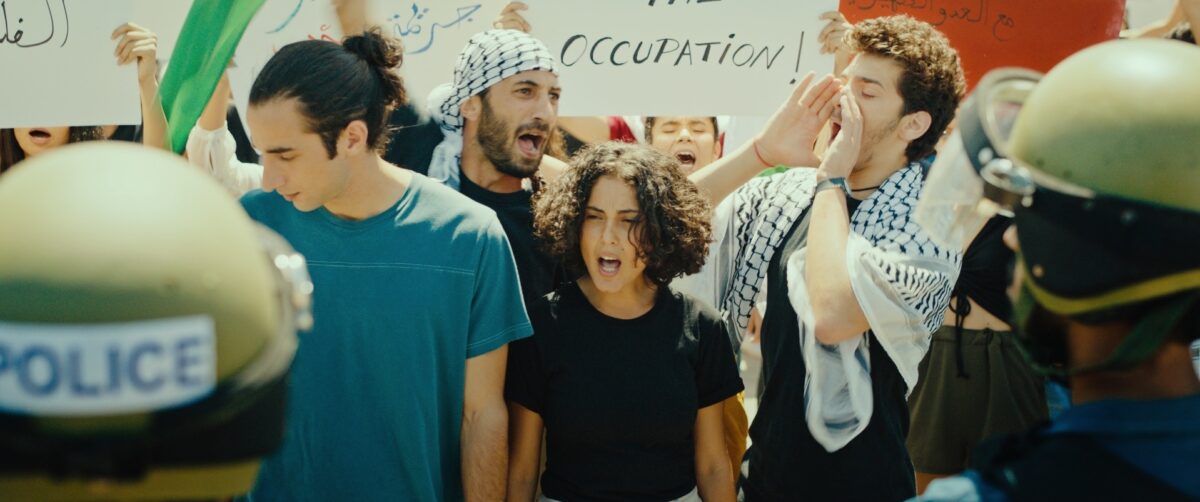How loyal are Israeli Arabs to Israel?
It’s a compelling question that has yet to be settled conclusively because this is a devilishly complicated issue.
Since the Muslim and Christian Arab citizens of Israel are essentially Palestinians, the descendants of the 160,000 Palestinian Arabs who remained in the country after Israel’s War of Independence in 1948, they must surely be torn by divided loyalties.
Firas Khoury’s Arabic-language movie, Alam (The Flag), deals frankly with this sensitive and potentially explosive matter. Now available on VOD platforms and digital outlets like Amazon and iTunes, it leaves the strong impression that Israeli Arabs are conflicted in terms of their loyalty to the Jewish state.
It should be noted that Alam was made and released before the current Israel-Hamas war.
Khoury himself may well exemplify this dichotomy. He was born in Eilabun, a largely Christian village in the Galilee that was caught in the crossfire of the first Arab-Israeli war 76 years ago. Its inhabitants were expelled to Lebanon during the heat of a battle, but were eventually allowed to return.
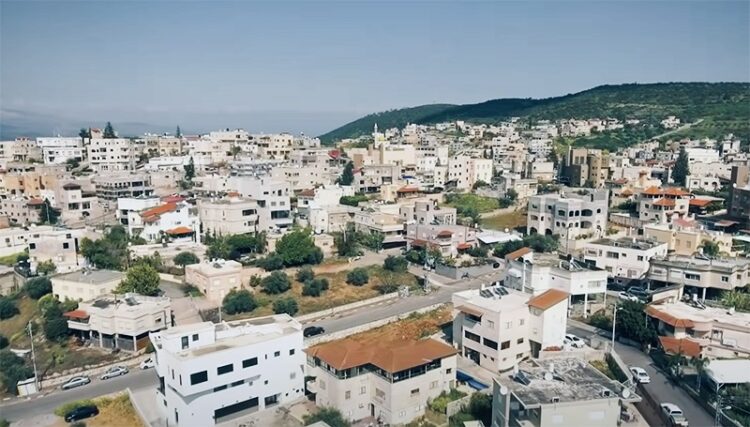
That Israel acknowledged their right of return, a slogan often flaunted by Palestinians these days, was a rare example of Israeli flexibility regarding this fraught issue.
Khoury was raised and educated in Israel, which grants all of its citizens equal rights, but which kept its Arab minority under the thumb of military rule until 1966. Today, Israeli Arabs comprise 21 percent of Israel’s population of nine million, yet they are not fully integrated into Israeli society and regard themselves as second-class citizens in some respects.
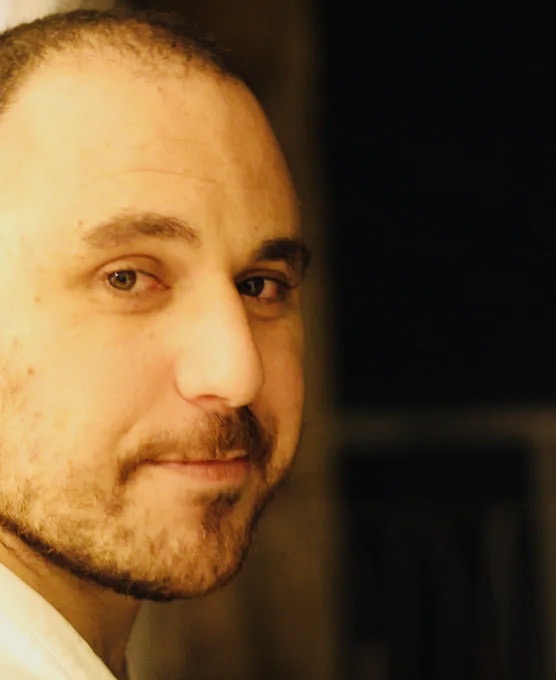
A number of Israeli Palestinians, like Khoury, resent their status and are alienated from Israel. Which may account for his residency in Tunisia.
Judging by his workmanlike film, his loyalty to Israel is, at best, skin deep and questionable.
Alam unfolds in an unidentified Arab village somewhere in Israel on the eve of Israel’s Independence Day in May. The main characters are a group of indolent high school students, chief among them being Tamer (Mahmoud Bakri), his girlfriend Maysaa (Sereen Khass), and their mutual friend Safwat (Muhammed Abed Elrahman).
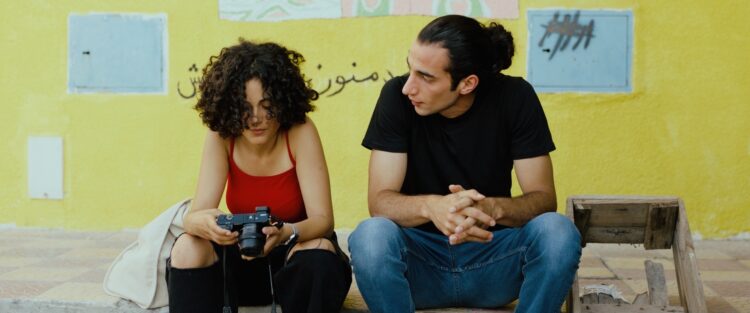
Khoury strikes a nationalistic note in the first scene, when the camera pans on an inflammatory inscription on a wall: “The day of their independence is the day our of our nakba.”
The nakba, an Arabic word meaning catastrophe, refers to the flight and expulsion of Arabs from Israel during the 1948 war. Upwards of 750,000 Arabs left their homes and properties during this tumultuous period. Very few of the refugees were permitted to go back to their homes, notwithstanding a United Nations resolution in 1948 demanding their right of return. Many still live in refugee camps in Jordan, Syria and Lebanon, dreaming of the day when they can reclaim their homes and lands.
Israel rejected and ignored the United Nations motion, fearing the returnees would be Fifth Columnists and would pose a dire threat to the demographic composition of the new state.
In Alam, there are basically two kinds of Arabs. The older generation, having come to terms with Israel’s existence, is pragmatic and avoids controversial political situations that may imperil their lives and livelihood. The newer generation tends to be militant and outspoken.
The history teacher in the local school has adapted to the times and hews to the Israeli curriculum with respect to the official narrative of the 1948 war. Tamer’s father, who is also non- political, urges him to focus on his studies and eschew involvement in an upcoming local event commemorating the nakba.
Tamer is not a political activist, but he is open to persuasion. Safwat is different. He’s a committed nationalist intent on replacing the Israeli flag with a Palestinian one on the anniversary of the nakba.
Recalling his father’s advice, Tamer warns Safwat that he will be courting danger if he goes through with his scheme. The Israeli police have already removed a Palestinian flag from a pylon and burned it in a show of intimidation and deterrence.
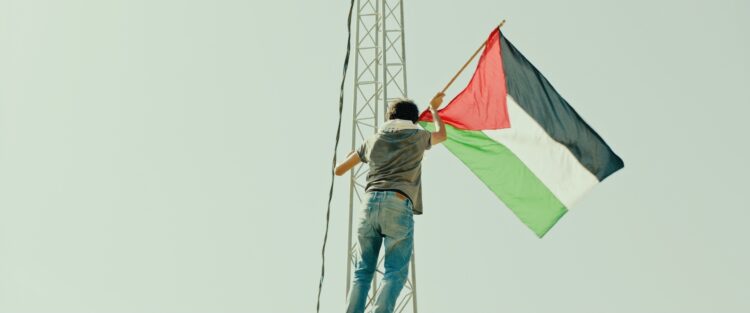
Tamer, portrayed by Bakri in a modulated performance, begins to wobble after meeting Maysaa. Like Safwat, she’s a nationalist. She convinces Tamer to accompany her to an event concerning “displaced villages.” This is apparently a reference to the 400 or more Palestinian villages in Israel that were abandoned by their residents under duress in 1948.
As the film unfolds, it becomes increasingly and overtly political. There are allusions to the “struggle,” the Gaza Strip, the Deir Yassin massacre of 1948, and the Jewish National Fund’s expropriation of Arab land to plant a forest. And in an early scene, an Arab soldier in the Israeli army walking on a road is deliberately tripped by a Palestinian nationalist.
In what is probably the film’s most pivotal scene, Safwat challenges his teacher’s interpretation of Israeli history, accuses him of being an Arab Uncle Tom, and briefly tells the story of his grandparents’ loss of their homes. A few of the students side with Safwat, but Tamer remains conspicuously silent.
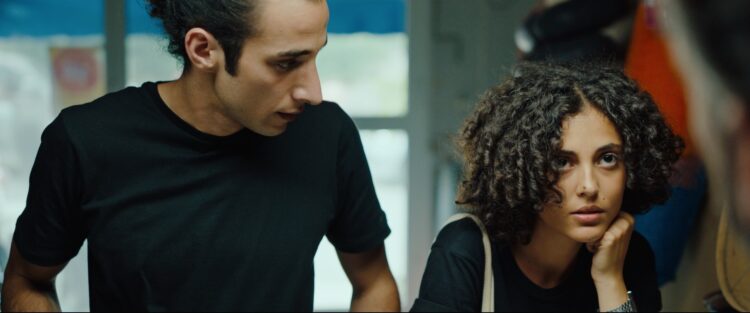
Influenced by Safwat and Maysaa, Tamer finally chooses sides during a vocal pro-Palestinian rally at which the Palestinian flag is proudly displayed and protesters chant, “We are born to be free” and “Palestine is free.”
This striking manifestation of Palestinian nationalism is met with force by police, but the demonstrators, including Tamer, remain unbowed and undaunted, proving the point that the sympathies of a segment of the Israeli Arab community lie with their fellow Palestinians outside Israel.
